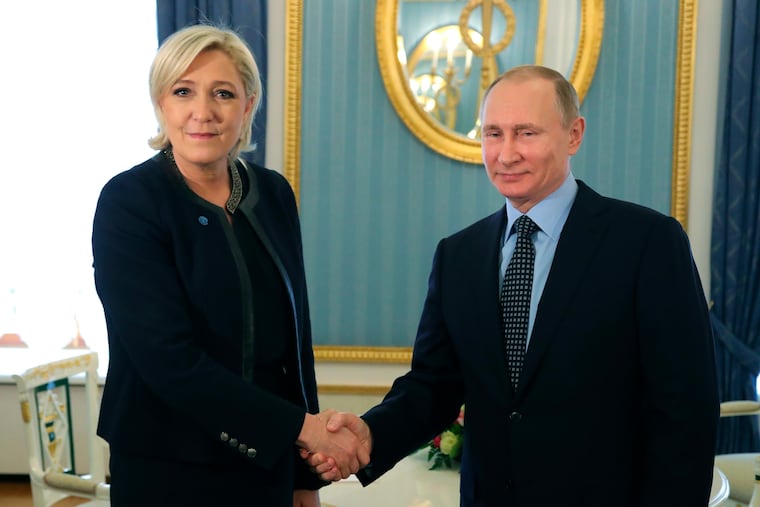Bravo to French voters for rejecting Marine Le Pen, who was beholden to Putin
It's a good thing Emmanuel Macron won the French election. The imprisoned Russian opposition leader Alexei Navalny tweeted from jail the ugly details of Marine Le Pen's dependence on Vladimir Putin.

Four days before French voters reelected Emmanuel Macron as president of France over his far-right challenger, Marine Le Pen, Macron got a strong endorsement from a famous political prisoner in Russia.
This endorsement, by Russia’s leading political opposition figure, Alexei Navalny — sent from a prison cell via Twitter — underlines why Le Pen’s loss was so critical for the future of Europe, for NATO, and for France.
Navalny warned that Le Pen’s far-right National Rally party was totally compromised by loans it had taken out from an obscure Russian bank in 2014.
“This is corruption — and it is a sale of political influence to Putin,” tweeted Navalny, who has been imprisoned since January 2021 after Russian President Vladimir Putin’s henchmen failed to kill him with poison.
Had Le Pen won, she would have undercut the unity Western democracies have shown in opposing Putin’s ugly Ukraine war and his horrendous war crimes.
» READ MORE: Want to know how to stop Putin? Listen to Baltic leaders. | Trudy Rubin
Le Pen is a Putin apologist who obtained those Russian loans — for 11 million euros (then worth $12.2 million) — to finance her run in the 2017 presidential election. Not long after receiving the funds, Le Pen endorsed Putin’s seizure and annexation of the Ukrainian territory of Crimea.
In this election, Putin’s woman in Paris had pledged to weaken the European Union, pull France out of NATO’s integrated command structure, stop sending arms to Ukraine, and seek rapprochement with Russia.
Navalny’s warning is important as many commentators downplay the significance of the Macron win.
Some French political analysts argue Macron’s victory doesn’t prove that his centrist platform has triumphed over domestic extremists. They note that Macron’s 17% margin of victory over Le Pen in the second and final round of the presidential election was smaller than the spread in 2017.
And it is true that, from a domestic standpoint, Macron is still confronting many of the same problems as the United States and other Western democracies. In polling, many voters were angry about the cost of living, the rise in energy prices, and the perception that they are being ignored. In that climate — as in the U.S. — conspiracy theories run wild, and fears about immigration are fanned by the right.
Macron’s centrist party, which revolves around his leadership, faces a huge challenge in upcoming parliamentary elections. The two formerly dominant French parties of the center-left and center-right are on the verge of collapse. Extreme parties on the left and right (including Le Pen’s) are on the rise.
But none of that obscures the main geopolitical point: France has just been rescued by voters from electing a leader who would have been in thrall to a Russian dictator who hates the West. Le Pen seemed oblivious to the cost of embracing Putin’s anti-democratic stance.
In his tweets, Navalny warned French voters who considered themselves “conservatives” that electing a Putin-hugger was anything but conservative. (One can only wish this warning would be taken to heart by so-called American conservatives who may want to embrace a Putin-hugger as the GOP nominee in 2024.)
“Every time European right-wingers express their sympathy for Putin for his ‘conservatism,’ I am utterly baffled,” Navalny tweeted, referring to Putin’s anti-feminist, pro-nationalist, and anti-gay stances, and his (fake) embrace of Christian religious values. “Putin and his top brass are totally immoral and despise family values: second and third families and mistresses with yachts are the norm for them.
“They despise the middle class and treat the working man with contempt; in Russia, those who work are paupers,” he continued.
But the story gets even worse. The Wall Street Journal recently reported that Le Pen has begun paying a settlement of 12 million euros ($12.94 million) to a Russian military contracting firm that is under U.S. sanctions — and has taken over the loan.
The message of this election, as Navalny spelled out so well: Avoid voting for presidential candidates who have done “business” with laundered Russian money. Those who pay the piper call the tune.
Yet there is another moral to this sordid election tale.
On the very day of the French election, CNN showed a terrific documentary called simply Navalny, that graphically presents the tale of how Putin’s intelligence agency poisoned Navalny in 2021 in Siberia with the banned nerve agent Novichok. Navalny was miraculously evacuated to Berlin where German doctors saved his life.
» READ MORE: Putin's nuclear saber-rattling must not prevent West from helping Ukraine | Trudy Rubin
Putin despised Navalny because the opposition leader devised a means of organizing alienated young people via social media all across Russia’s huge territory; youths who saw no future for themselves in today’s Russia demonstrated in remote towns and cities for change. Navalny’s anti-corruption movement — and the stunning investigative videos it aired on YouTube, tracking Russia’s massive corruption right up to Putin’s fabulous hidden palace — maddened the Russian leader.
After months of recovery in Germany, Navalny chose to return to Russia, knowing the risk. He was grabbed by police at the airport and jailed on fake charges. He will probably remain in prison as long as Putin is in power.
Navalny’s bravery highlights the unbridled corruption and ugly nationalism of political leaders who choose to ally themselves with and profit from the man in the Kremlin. Thankfully, French voters prevented one of those leaders from taking power — this time. Americans: Take note.